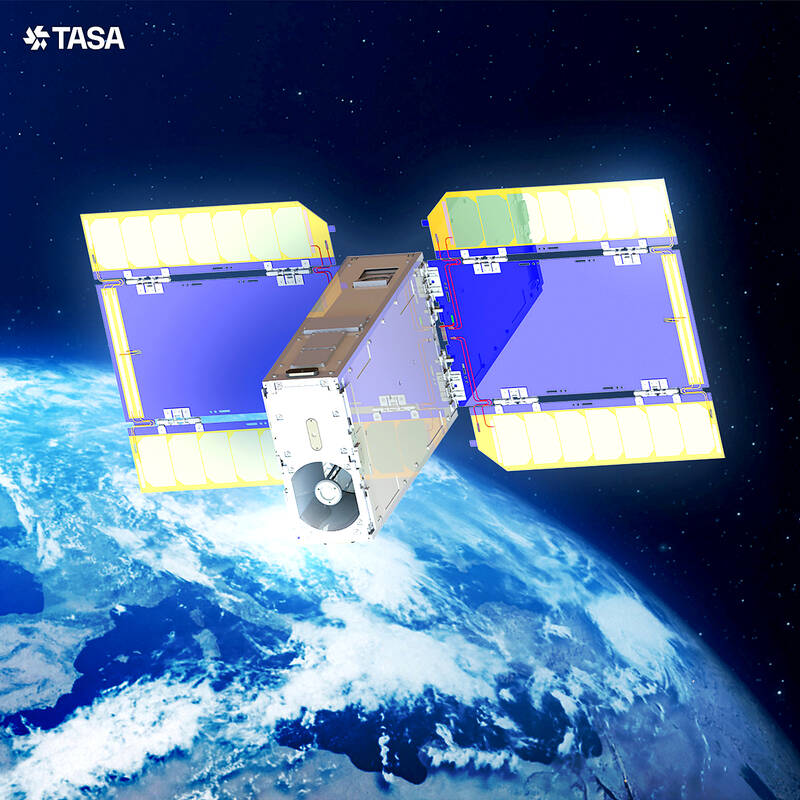The Taiwan Space Agency (TASA) on Wednesday announced that the Taiwan-Japan codeveloped small satellite Onglaisat had hit a key milestone by completing 50 imaging operations and successfully testing three key technologies.
After nearly three months of in-orbit operation, Onglaisat achieved its objectives after downloading and processing 50 images of the Earth, TASA said.
Onglaisat had also successfully tested the Korsch off-axis optical system, the complementary metal oxide semiconductor (CMOS) time delay and integration (TDI) image sensor, and the JPEG 2000 onboard compression capability, TASA added.

Photo courtesy of the Taiwan Space Agency
Onglaisat project leader Chan Chen-yu (詹鎮宇) said that small satellites, or cubesats, are a quicker and more affordable “pathfinder” to test emerging space technologies.
The project was launched to test the feasibility of systems for use in future ultra-high-resolution optical remote sensing satellites, he added.
Regarding the off-axis optical system aboard Onglaisat, Chan said that while it presents greater design, manufacturing and assembly challenges, it has a more compact structure and improved optical performance.
With successful testing, the technology could be used on larger satellites, which would help improve image resolution, he added
The CMOS TDI image sensor, which enhances sensitivity and image quality, is the first TDI image sensor developed in Taiwan to be successfully tested in a space mission, potentially helping the country develop its own satellites, Chang said.
As for the JPEG 2000 onboard compression capability, it enables more efficient use of satellite data storage and downlink bandwidth, preventing bottlenecks in data transmission, he added.
The Onglaisat project is a collaboration project between TASA and the Intelligent Space Systems Laboratory at the University of Tokyo’s Department of Aeronautics and Astronautics, along with several Japan-based start-up companies.
Launched into space from the US on Nov. 5 last year, Onglaisat was deployed into a 410km low Earth orbit from the International Space Station on Dec. 9 last year, TASA said.
Its mission is expected to last until early March, TASA added.

SHIPS, TRAINS AND AUTOMOBILES: The ministry has announced changes to varied transportation industries taking effect soon, with a number of effects for passengers Beginning next month, the post office is canceling signature upon delivery and written inquiry services for international registered small packets in accordance with the new policy of the Universal Postal Union, the Ministry of Transportation and Communications said yesterday. The new policy does not apply to packets that are to be delivered to China, the ministry said. Senders of international registered small packets would receive a NT$10 rebate on postage if the packets are sent from Jan. 1 to March 31, it added. The ministry said that three other policies are also scheduled to take effect next month. International cruise ship operators

HORROR STORIES: One victim recounted not realizing they had been stabbed and seeing people bleeding, while another recalled breaking down in tears after fleeing A man on Friday died after he tried to fight the knife-wielding suspect who went on a stabbing spree near two of Taipei’s busiest metro stations, Taipei Mayor Chiang Wan-an (蔣萬安) said. The 57-year-old man, identified by his family name, Yu (余), encountered the suspect at Exit M7 of Taipei Main Station and immediately tried to stop him, but was fatally wounded and later died, Chiang said, calling the incident “heartbreaking.” Yu’s family would receive at least NT$5 million (US$158,584) in compensation through the Taipei Rapid Transit Corp’s (TRTC) insurance coverage, he said after convening an emergency security response meeting yesterday morning. National

PLANNED: The suspect visited the crime scene before the killings, seeking information on how to access the roof, and had extensively researched a 2014 stabbing incident The suspect in a stabbing attack that killed three people and injured 11 in Taipei on Friday had planned the assault and set fires at other locations earlier in the day, law enforcement officials said yesterday. National Police Agency (NPA) Director-General Chang Jung-hsin (張榮興) said the suspect, a 27-year-old man named Chang Wen (張文), began the attacks at 3:40pm, first setting off smoke bombs on a road, damaging cars and motorbikes. Earlier, Chang Wen set fire to a rental room where he was staying on Gongyuan Road in Zhongzheng District (中正), Chang Jung-hsin said. The suspect later threw smoke grenades near two exits

The Forestry and Nature Conservation Agency yesterday launched a gift box to market honey “certified by a Formosan black bear” in appreciation of a beekeeper’s amicable interaction with a honey-thieving bear. Beekeeper Chih Ming-chen (池明鎮) in January inspected his bee farm in Hualien County’s Jhuosi Township (卓溪) and found that more than 20 beehives had been destroyed and many hives were eaten, with bear droppings and paw prints near the destroyed hives, the agency said. Chih returned to the farm to move the remaining beehives away that evening when he encountered a Formosan black bear only 20m away, the agency said. The bear